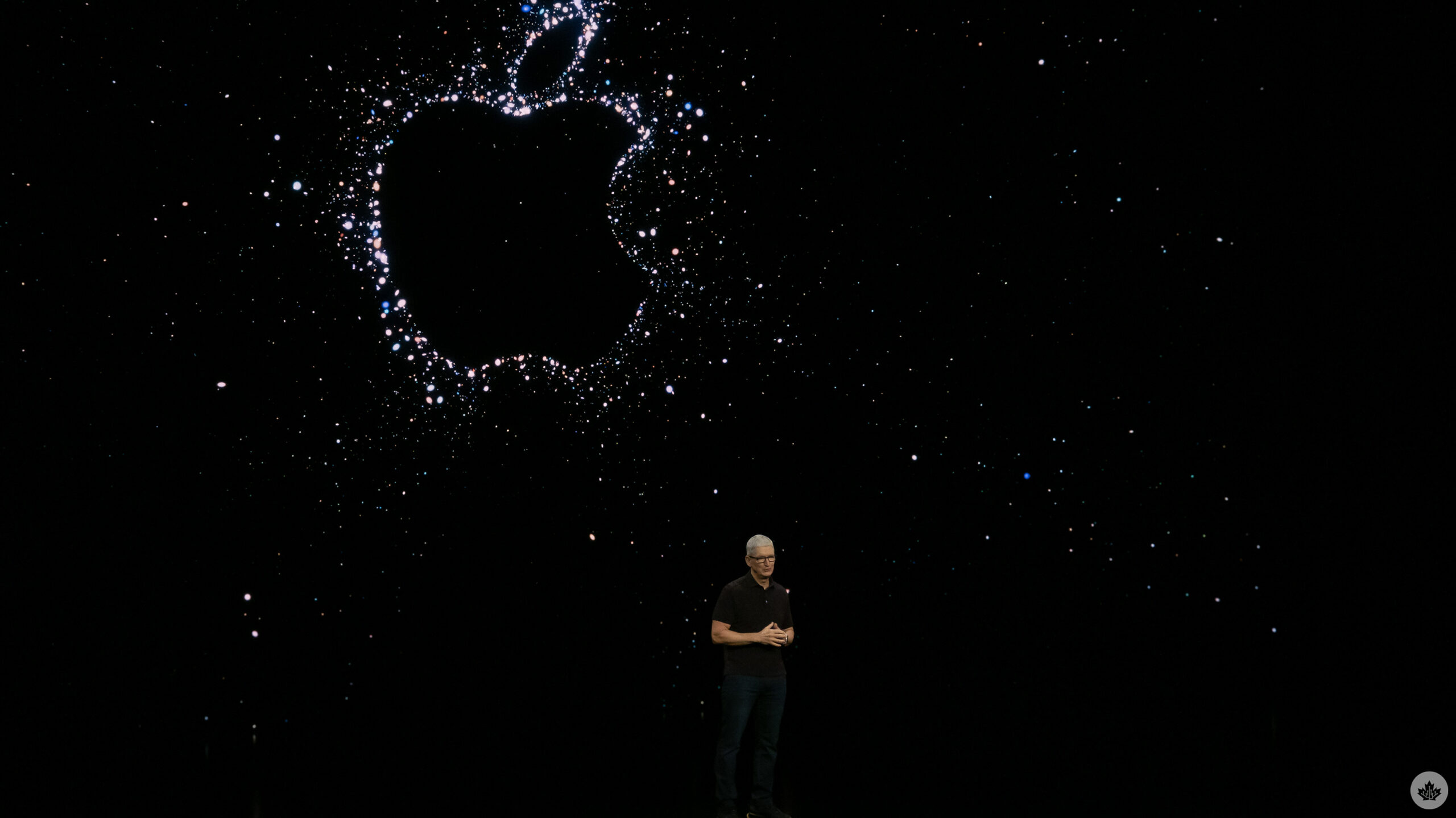
Whether it’s YouTube, MobileSyrup, or your favourite podcast, advertising is the cornerstone to making the digital economy a viable place for people to make their careers.
While ads aren’t the prettiest way to earn revenue, they’re the reason so much amazing content can be brought to us for free.
People who don’t enjoy ads have premium subscription options such as YouTube Premium or Patreon memberships, and even Netflix now offers a lower-tier, ad-supported subscription.
However, what happens when you force ads on users even when they paid for something? What about when users have no alternative? You might feel as though that’s a money grab.
Apple’s headline for the App Store is “The apps you love. From a place you can trust.” Yet, it seems less and less like the App Store is a well-curated, safe, and secure experience for finding apps. Instead, it’s the company’s attempt to maximize revenue and never leave a dollar on the table despite the cost to user experience.
Apple recently expanded the ads placements on the iOS app store. App Store ads enrage me more than any other type of advertisement, and by the end of this article, you’ll likely feel the same.
App Store Ads
Modern Apple is a revenue-generating machine, constantly pushing to show growth to please the stock market. Today’s Apple is very different than the cash-strapped company Steve Jobs had to save from the brink of bankruptcy. As an Apple user, I’m willing to defend just about any decision the company makes in most respects. However, App Store ads are a bridge too far.
Users turn to the Apple platform because they feel it’s more private and offers a premium user experience. After all, you’re paying a lot of money for that logo. Compare an Apple TV to an Amazon Fire Stick. The Apple TV starts at $179, whereas Fire Sticks begin at $49 when not on sale. A Roku streaming stick starts at $39. These manufacturers offer insanely low prices because the platforms are subsidized by user data collection that drives ads.
Apple, a company worth several trillion, makes the vast majority of its revenue from hardware sales. Because of this, it doesn’t require advertisements to fund its business. Yet, the Cupertino, California company seems to think tainting the user experience is worth it in exchange for another billion on its already annual hundred-billion dollar pile.
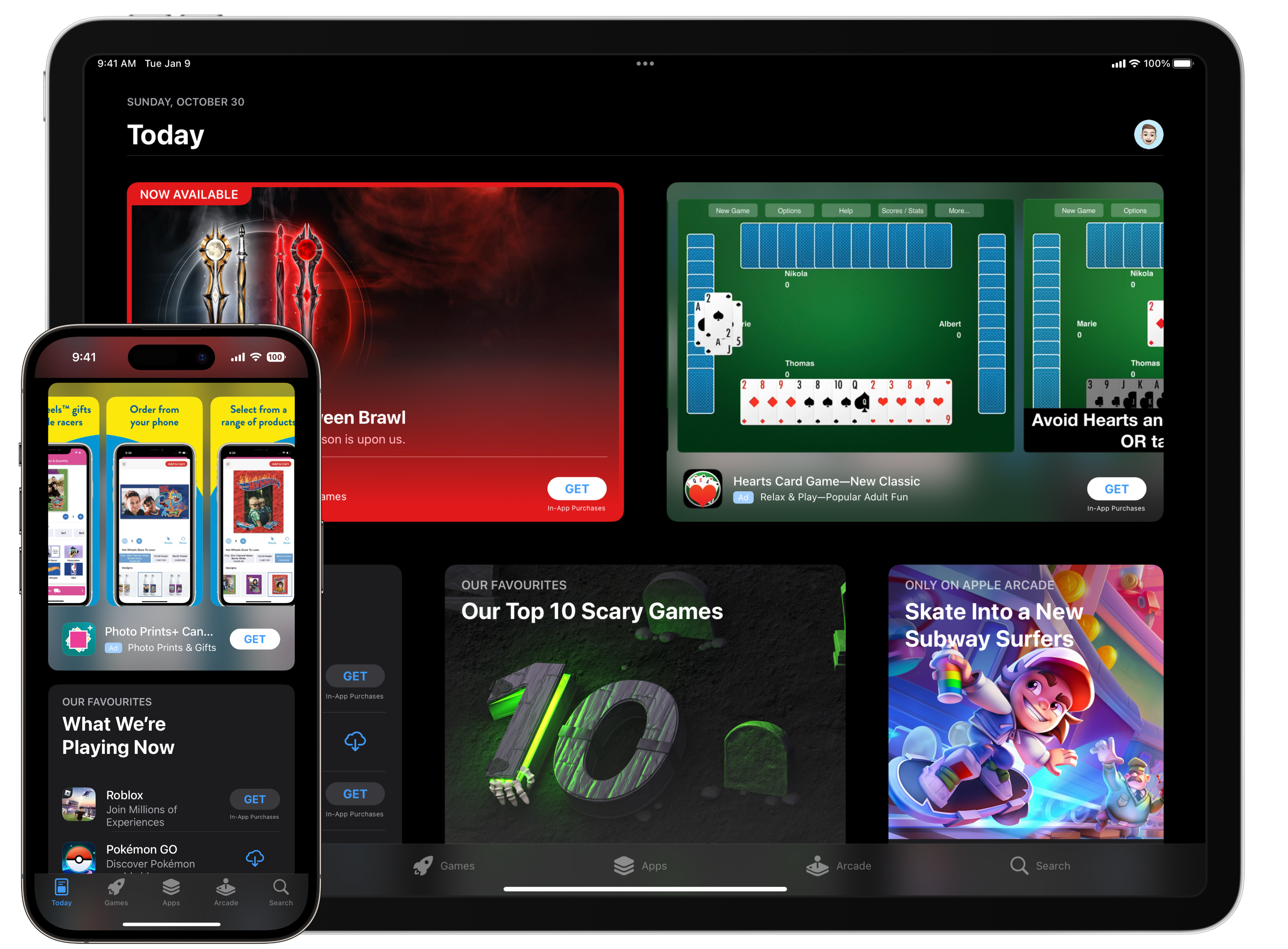 When you launch the App Store, you’ll first see a homepage ad, likely for a high-profile app with a hefty marketing budget to spend. Next, you search for an app where you’ll see an ad before you tap the search bar right above your actual search result.
When you launch the App Store, you’ll first see a homepage ad, likely for a high-profile app with a hefty marketing budget to spend. Next, you search for an app where you’ll see an ad before you tap the search bar right above your actual search result.
These ads are likely for apps of mixed quality. It could be Amazon trying to show up above Netflix or smaller, more random apps trying to get a few accidental downloads. Finally, and most recently, there are now even ads that show up on an app’s information page. An experience once held dear by individual developers now shows completely random ads in the mistakenly titled “you also might like” section.
Problem 1: Greed
Some may consider the App Store a free service, but I don’t. I pay for many apps, in-app purchases, and App Store subscriptions yearly. Meaning Apple is earning between 15 to 30 percent of the likely hundreds of dollars I spend on the App Store alone per year. Which begs the question, why does the App Store needs ads?
YouTube’s whole business model is advertising, allowing videos to be accessible to viewers. YouTube then splits its ad revenue 55 percent for the creator and 45 percent for itself. One can argue if that split is fair or not. But for the context of this piece, revenue sharing is positive regardless.
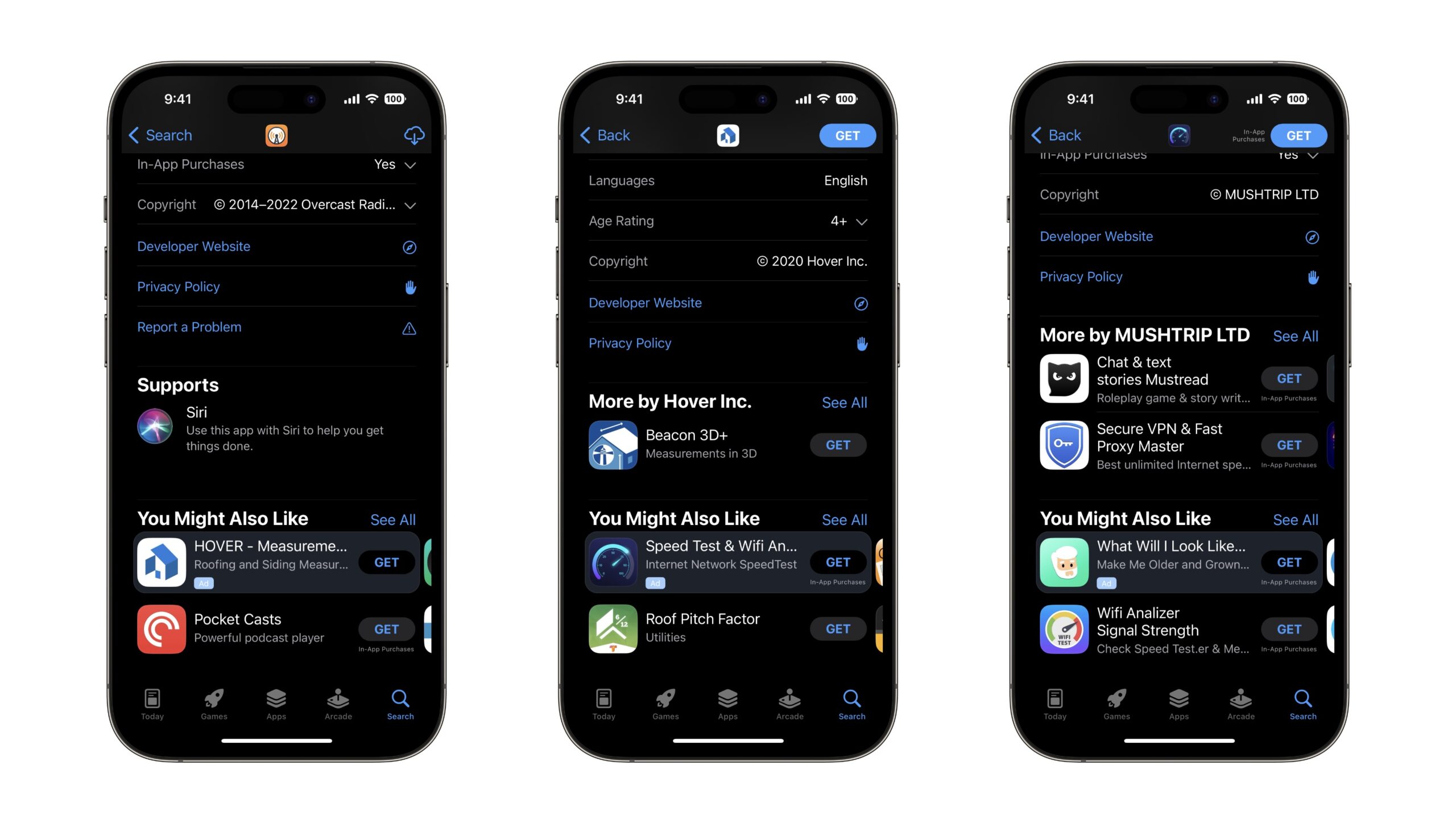 Now, we have Apple placing ads around an App Store that doesn’t need the supporting revenue to survive. The App Store is already grossly profitable and faces some very concerning anti-trust allegations. Yet, Apple wants to go further by placing (sometimes poorly chosen) ads on developer’s app pages. On October 25th, Apple began placing ads under the “You Also Might Like” section.
Now, we have Apple placing ads around an App Store that doesn’t need the supporting revenue to survive. The App Store is already grossly profitable and faces some very concerning anti-trust allegations. Yet, Apple wants to go further by placing (sometimes poorly chosen) ads on developer’s app pages. On October 25th, Apple began placing ads under the “You Also Might Like” section.
What followed was developers reporting ads for apps they disagreed with appearing on their discovery pages, such as gambling, sketchy games, and data apps. It was noticed that at least one gambling recovery app had an ad placed on it for a gambling app. Not a great first day. Two days later, Apple said it paused advertising of gambling apps, among a few other categories, at least temporarily.
With Apple already taking 15 to 30 percent of any app revenue, it hardly seems fair the company is double dipping revenue generation with the App Store. Ads certainly ruin what is otherwise a premium experience. The preference would be for Apple to remove ads altogether. However, if the tech giant wanted to keep App Store ads, it should split that revenue with developers. If you’re a developer of a super popular app, your discovery page is more than likely to be a prime place for an ad. Yet, you’d see none of that benefit.
Problem 2: Misleading
Thinking back to my days working at the Apple Store, I remember how irritating App Store search ads were. You’d have a senior first-time iPad user go to the App Store to download Netflix, and the first thing she saw wasn’t Netflix. It was probably some Netflix knock-off. But, of course, she didn’t know that. She trusted that her Apple device would make the first result, the correct result.
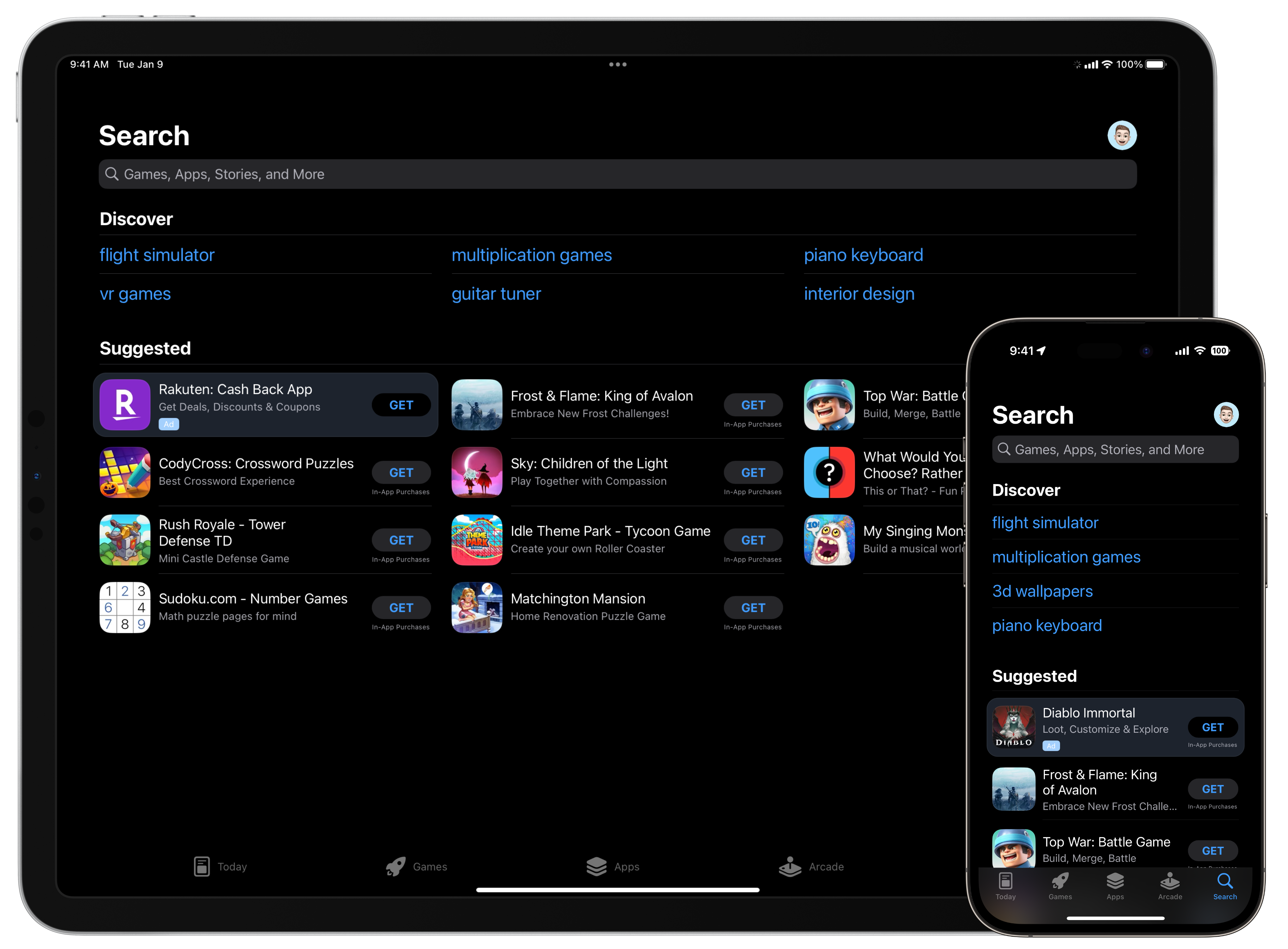 Over the past few years, as Apple has refined the App Store experience, the company has worked hard to turn the ‘Today’ tab into a place for quality app recommendations. Yet, the company is now taking that trust to place a prominent ad right on the front of the App Store.
Over the past few years, as Apple has refined the App Store experience, the company has worked hard to turn the ‘Today’ tab into a place for quality app recommendations. Yet, the company is now taking that trust to place a prominent ad right on the front of the App Store.
Lastly, there’s the ‘You Might Also Like’ section which someone would assume shows related apps that were downloaded along with the initially searched app. But, of course, Apple placed an ad there too.
While App Store ads may have a small ‘ad’ tag on them, it’s far from actually noticeable. It sucks having to explain to someone who spent hundreds or even thousands of dollars on a new tablet that they need to avoid the App Store ads.
Apple has long communicated that it’s a company of quality. Yet, App Store ads don’t support that claim one bit. The value that digital advertisements typically provide is relevance. Instead, these ads feel random and misplaced. The relevancy of these once-targeted sections is ruined, and the user experience is cheapened. All because Apple sold some of its influence in the App Store.
Problem 3: Anti-Competitive
The App Store is rife with anti-competitive challenges ranging from companies like Spotify and Epic Games to government bodies like the European Union (EU). Leaving my personal opinion on App Store monopolization aside, it should be noted that these ads don’t help Apple’s position.
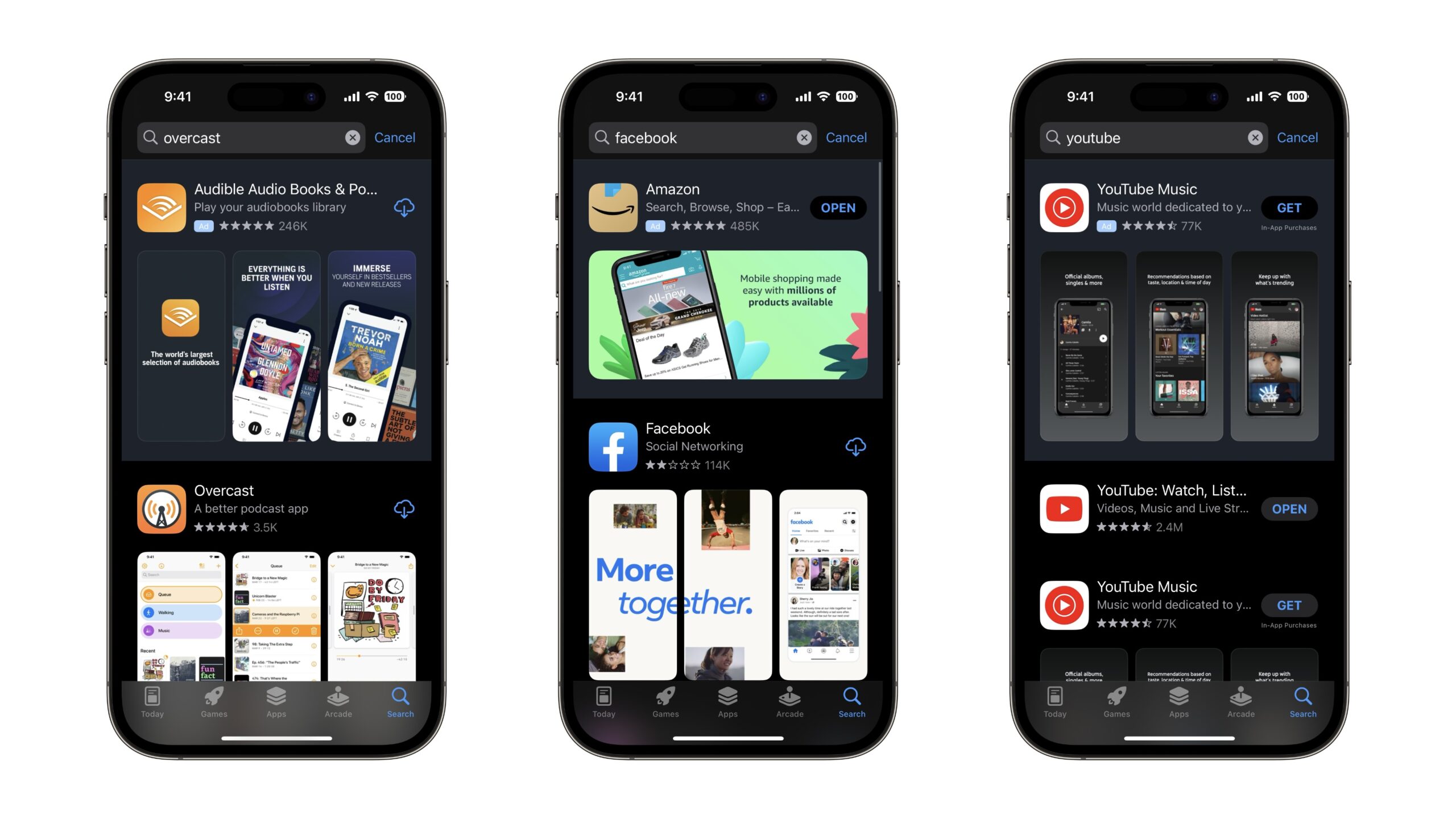 The App Store is already a highly profitable line of business, now tainted with ads that worsen the user experience and developer relations. Apple is creating a second marketplace. Developers already give Apple massive commissions on app revenues. Yet, Apple is also selling the app’s best search phrases to deep-pocketed competitors.
The App Store is already a highly profitable line of business, now tainted with ads that worsen the user experience and developer relations. Apple is creating a second marketplace. Developers already give Apple massive commissions on app revenues. Yet, Apple is also selling the app’s best search phrases to deep-pocketed competitors.
This leaves indie developers in a tough spot. Should they want to maintain their results in the App Store, they’ll need to buy their placement. Indie developers are forced to give Apple more money while venture-backed apps peddling mediocre products continue along.
While App Store ads are vastly more user privacy-focused than any traditional advertising platform and give app developers a way to grow their audiences, there is no clear end to where Apple will stop placing more ads in the App Store. These ads continue to chip away at the trust user’s place in Apple.
The Future of Apple’s Ads Business
If you’re like me and think App Store ads are wrong, then you wait. It may get a lot worse. It’s rumoured that Apple will soon expand its advertising ambitions to Apple Maps, Books and Podcasts.
On the one hand, if you don’t like ads in either of those two apps, you can download an alternative, unlike the App Store. However, these ads will undoubtedly ruin the positive experience many of us have with these apps.
I consider Maps and Podcasts, among others, as part of my iPhone, not as separate services that need ads to support their existence. They’re apps that provide value to buying Apple’s smartphone.
Even if Apple’s ads are more private than the rest of the industry, that doesn’t change the fact that no ads are the best when creating a premium user experience.
Advertising is a business model that many companies need to survive. Apple is not one of those. We pay a lot of money for these devices, and Apple’s ad ambitions are ruining that experience.
MobileSyrup may earn a commission from purchases made via our links, which helps fund the journalism we provide free on our website. These links do not influence our editorial content. Support us here.


